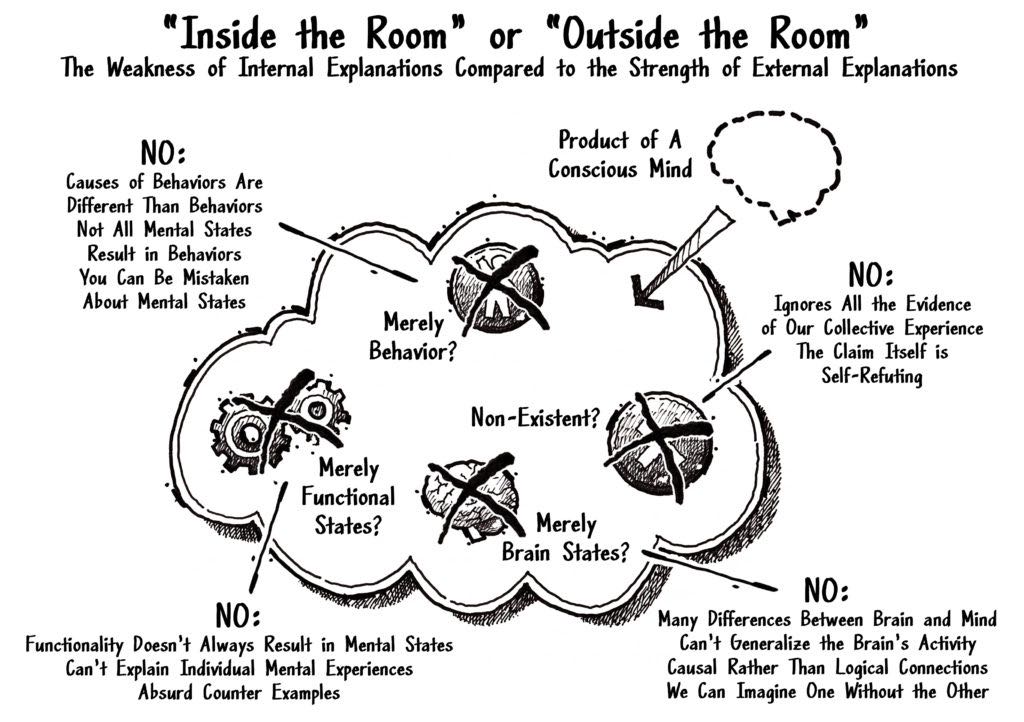
Most of us who are even remotely familiar with the history of science recognize some theories have a shorter shelf life than others. There was a time, for example, when scientists trying to understand the nature of combustion proposed a fire-like element called phlogiston. When asked to describe what happened at the point of combustion, they might have responded, “When something begins to combust, phlogiston is released.”
As scientists learned more about the nature of combustion and the role of oxygen, they abandoned the faulty theory of phlogiston, along with its antiquated terminology. Scientists eventually replaced this archaic explanation with current oxidation theories. Some philosophers, known as eliminative materialists, view “mental states” as yet another outdated, faulty notion riddled with antiquated language from “folk psychology.”
In the past, for example, we might have described mental states—such as happiness—by saying something like “People who are happy tend to smile.” But from the perspective of the eliminative materialist, this explanation is just as outdated as “When something begins to combust, phlogiston is released.” From the perspective of eliminative materialism, there is no such thing as a mental state any more than there is phlogiston. Smiles are simply the result of physical activity in the brain.
If we can eliminate mental states in this way (by eliminating the terminology we have been using to describe them), we can certainly stay “inside the room” of the physical universe for explanations of brain activity, but eliminative materialism has its own liabilities:
The Evidence for Eliminative Materialism Isn’t as Strong as the Evidence from Intuition and Experience
Philosophers and scientists recognize eliminative materialism as an extreme position because of its inability to explain our conscious experiences evidentially. Our own firsthand access provides us with evidence of such experiences, as each of us is aware of our own mental states. Eliminative materialists provide very little evidence to support their proposal outside of their complaints related to the limitations of “folk psychology” and its terminology. The evidence for mental states (as experienced by each of us intuitively) seems far greater than any evidence against such states. The weaknesses we’ve described in the other physicalist theories of mind only exacerbate the problem. If we are going to be asked to abandon our belief in our own mental states, the evidence ought to be far more significant than what has been offered by eliminative materialists.
Eliminative Materialism Is Self-Refuting
More importantly, eliminative materialism presupposes the very thing it is trying to eliminate. Eliminativists believe something is true about mental states: their nonexistence. But when we believe a truth about something (including mental states), we must first believe in the existence of the mental state of “intentionality” (the “about-ness” I describe in my book). In other words, to declare eliminative materialism as an explanation for mind, the eliminativist must first believe the theory to be true. But if beliefs about theories do exist, eliminative materialism is, by definition, false because it employs a mental state it denies.
I’ve edited and excerpted this brief summary from my expansive (and referenced) investigation in God’s Crime Scene. Any effort to deny the distinct differences between mental states and brain states simply ignores the evidence, errantly redefines the nature of the mind, or suffers from a logical inconsistency (three flaws common to false arguments in most criminal trials). I describe a number of these naturalistic alternatives in the book:

An Illustration from God’s Crime Scene
Mental states do exist, in spite of any efforts to redefine them. An ultimate explanation for the universe must account for this non-material, non-spatial reality. Atheism simply cannot adequately explain our experience of mind. If, however, there is an all-powerful mind who created the universe and conscious creatures in His image, consciousness is not only reasonable but inevitable. Mental states do exist, in spite of any efforts to redefine them. An ultimate explanation for the universe must account for this non-material, non-spatial reality. Atheism simply cannot adequately explain our experience of mind. Share on X

J. Warner Wallace is a Dateline featured Cold-Case Detective, Senior Fellow at the Colson Center for Christian Worldview, Adj. Professor of Christian Apologetics at Talbot School of Theology, Biola University, author of Cold-Case Christianity, God’s Crime Scene, and Forensic Faith, and creator of the Case Makers Academy for kids.
Subscribe to J. Warner’s Daily Email
Save
Save
Save
J. Warner Wallace is a Dateline featured cold-case homicide detective, popular national speaker and best-selling author. He continues to consult on cold-case investigations while serving as a Senior Fellow at the Colson Center for Christian Worldview. He is also an Adj. Professor of Christian Apologetics at Talbot School of Theology, Biola University, and a faculty member at Summit Ministries. He holds a BA in Design (from CSULB), an MA in Architecture (from UCLA), and an MA in Theological Studies (from Gateway Seminary).
































